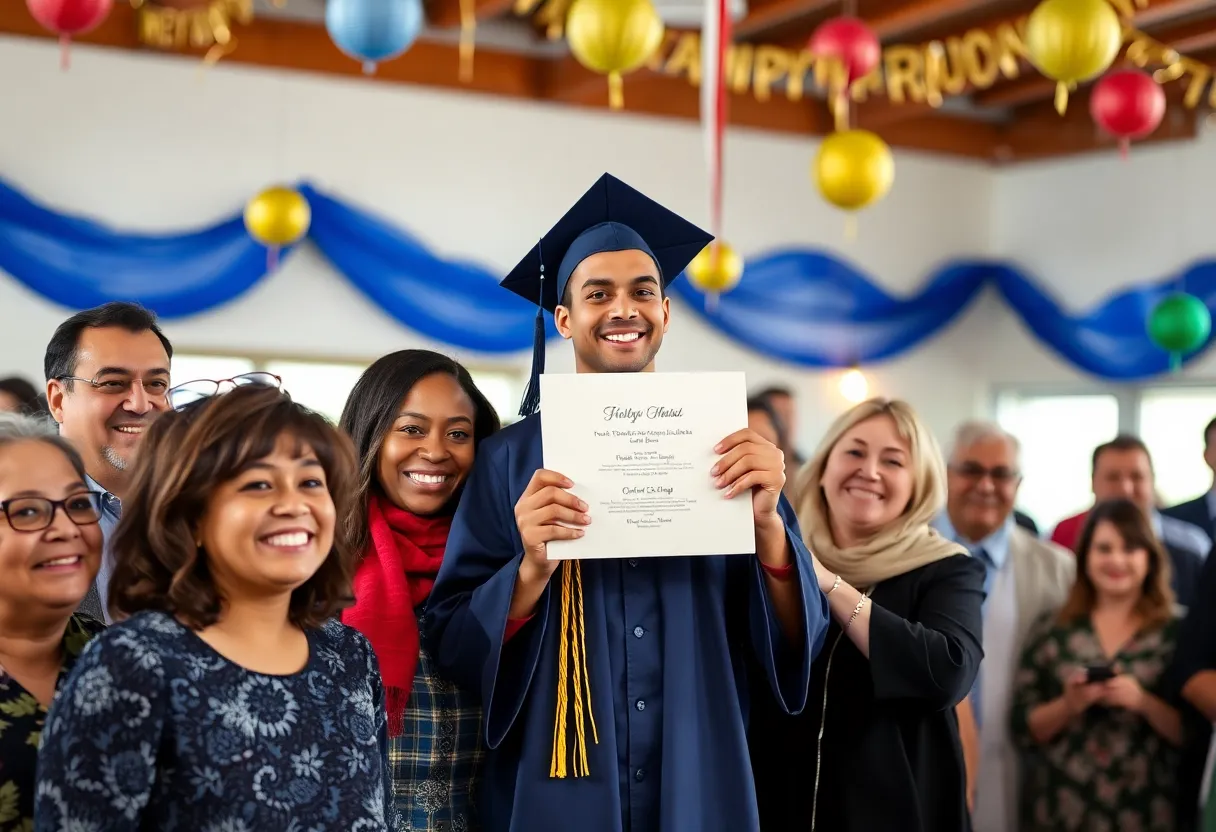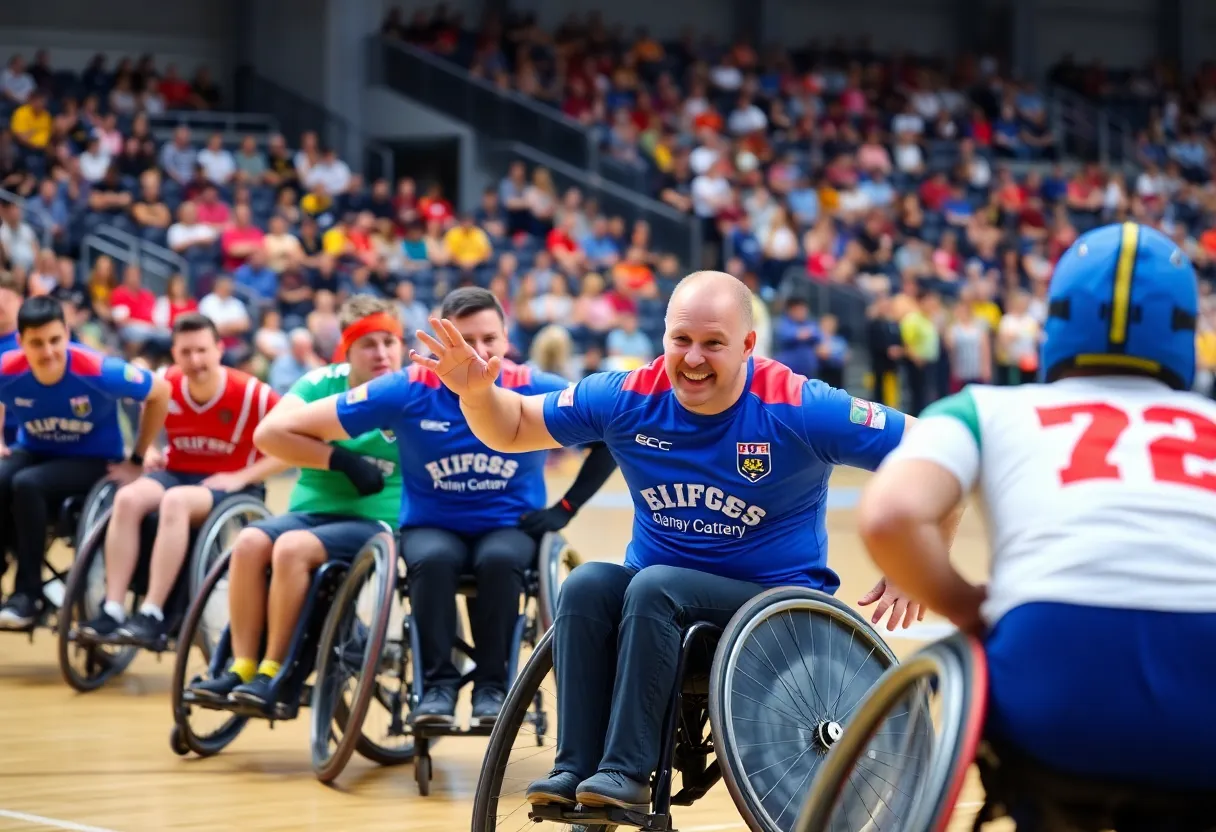Louisville, October 7, 2025
Marcus Johnson, a Louisville resident, recently graduated with a criminal justice degree from the University of Louisville, marking a significant achievement after serving 11 years in prison for a non-violent offense. His success is a testament to the reentry program that aids formerly incarcerated individuals in pursuing higher education. This milestone not only demonstrates personal transformation but also highlights the importance of educational support for community reintegration and rehabilitation.
Louisville
Louisville resident Marcus Johnson, 35, graduated from the University of Louisville with a bachelor’s degree in criminal justice, marking a significant milestone after serving 11 years in prison for a non-violent offense. The graduation ceremony highlighted his participation in the university’s reentry program, which supports formerly incarcerated individuals in pursuing higher education. This achievement underscores the potential for personal transformation through educational opportunities, even after major setbacks.
Johnson’s journey began upon his release from prison, where he enrolled in the University of Louisville’s reentry program. Designed to ease the transition back into academic life, the program provides resources such as academic advising, financial aid assistance, and peer support networks tailored to the unique challenges faced by returning citizens. Over the course of several years, Johnson completed the rigorous requirements for his degree, balancing coursework in areas like criminology, law enforcement ethics, and social justice. His persistence paid off during the recent commencement exercises, where he walked across the stage to receive his diploma among hundreds of other graduates.
The event drew attention to the broader impact of such programs within the Louisville community. University leaders, including President Dr. Kimberly Bradley, acknowledged the importance of initiatives like this in offering second chances. They emphasized how education can break cycles of disadvantage and open doors to new career paths. For Johnson, the criminal justice degree aligns directly with his experiences, positioning him to contribute to discussions on reform and rehabilitation. His story has resonated with local organizations focused on justice reform, inspiring them to advocate for expanded access to higher education for similar individuals.
Background on the Reentry Program
The University of Louisville’s reentry program was established to address the high barriers to education faced by people with criminal records. These barriers often include limited access to funding, stigma in academic settings, and logistical challenges like transportation or housing. The program partners with local correctional facilities and community groups to identify motivated participants early in their release process. Once enrolled, students receive mentorship from faculty who specialize in restorative justice topics, ensuring the curriculum is relevant and supportive.
Statistics from similar programs across the U.S. show that graduates like Johnson experience lower recidivism rates and higher employment success. In Louisville, where the criminal justice system has seen recent reforms, such educational pathways are increasingly viewed as key to community safety and economic growth. Johnson’s case exemplifies how targeted support can lead to meaningful outcomes, encouraging more institutions to develop comparable efforts.
Community and Educational Implications
Beyond the individual success, Johnson’s graduation sparks conversations about second chances in higher education. Local advocates point out that non-violent offenses disproportionately affect underserved populations in Louisville, and programs like this help mitigate long-term societal costs. The university’s commitment to inclusive education is part of a larger trend in Kentucky, where state initiatives aim to integrate reentry support into public universities.
For those considering similar paths, Johnson’s experience demonstrates the value of resilience. The reentry program not only provides academic tools but also builds a support system that fosters confidence and purpose. As more stories like his emerge, they highlight the transformative power of education in overcoming past obstacles. This graduation serves as a beacon for others in the community facing their own challenges, showing that higher education remains accessible with the right resources.
Looking Ahead
Moving forward, Johnson’s degree opens possibilities in fields related to criminal justice reform, counseling, and policy advocacy. His achievement also prompts the University of Louisville to evaluate and potentially expand its reentry offerings. Community feedback suggests a growing demand for such programs, with calls for increased funding to accommodate more participants. In a city like Louisville, known for its blend of urban opportunities and social challenges, stories of redemption through education continue to inspire collective progress.
This event reinforces the role of universities in social equity, proving that determined individuals can rewrite their futures. As Johnson steps into the next chapter, his path encourages a broader dialogue on rehabilitation and opportunity in America.
FAQ
Who is Marcus Johnson and what did he achieve?
Louisville resident Marcus Johnson, 35, graduated from the University of Louisville with a bachelor’s degree in criminal justice.
What was Marcus Johnson’s background before graduation?
Marcus Johnson served 11 years in prison for a non-violent offense before participating in the university’s reentry program.
What is the University of Louisville’s reentry program?
The University of Louisville’s reentry program supports formerly incarcerated individuals in pursuing higher education.
How has Johnson’s story impacted the community?
Johnson’s journey motivates others in the community to pursue higher education despite setbacks.
What recognition did the graduation receive from university leaders?
UofL President Dr. Kimberly Bradley praised Johnson’s resilience, highlighting the program’s role in second chances.
Key Features Chart
| Feature | Description |
|---|---|
| Graduate | Louisville resident Marcus Johnson, 35 |
| Degree Earned | Bachelor’s in criminal justice from the University of Louisville |
| Prison Term | 11 years for a non-violent offense |
| Program Involved | University of Louisville’s reentry program |
| Community Impact | Motivates others to pursue higher education despite setbacks |
| Recognition | Praised by UofL President Dr. Kimberly Bradley for resilience and second chances |
Deeper Dive: News & Info About This Topic
HERE Resources
Fatal Apartment Fire Claims Life in Louisville’s Algonquin Neighborhood
Teenage Girls Shot in Louisville’s Chickasaw Neighborhood
Tragic Motorcycle Crash Claims Two Lives in Mt. Washington
Bluegrass Ventures Invests $10 Million in PaySecure
Louisville Residents Targeted by AAA Phishing Scam
Louisville’s New Youth Detention Center Signals Progress in Juvenile Justice Reform
Louisville’s Artists & Afros Event Showcases Black Creativity
Louisville’s Final West End Farmers Market Concludes with Fall Festival
University of Kentucky Faces Title IX Violations in Federal Investigation
Bellarmine University Initiates $75 Million Campaign





